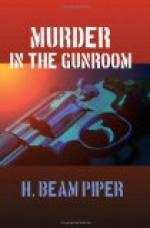“Well, now, you’re asking me to be disloyal to my employer,” Rand objected. “Why don’t you ask her that? If she wants you to know, she’ll tell you.”
“Dammit, I can’t! Suppose she’s satisfied that it really was an accident; would I want to start her worrying and imagining things?”
“No, I suppose you wouldn’t,” Rand conceded. “You’re not at all satisfied on that point yourself, are you?”
“Well, are you?” Dunmore parried.
That sort of fencing could go on indefinitely. Rand determined to stop it. After all, if Dunmore was the murderer of Lane Fleming, he would already know how little Rand was deceived by the fake accident; the Leech & Rigdon had told him that already. If he weren’t, telling him would do no harm at this point, and might even do some good.
“Why, I think Fleming was murdered,” Rand told him, as casually as though he were expressing an opinion on tomorrow’s weather. “And I further believe that whoever killed Fleming also killed Arnold Rivers. That, by the way, is where I come in. Stephen Gresham has retained me to find the Rivers murderer; to do that, I must first learn who killed Lane Fleming. However, I was not retained to investigate the Fleming murder, and as far as I know from anything she has told me, Gladys Fleming is quite satisfied that her husband shot himself accidentally.” In a universe of ordered abstractions and multiordinal meanings, the literal truth, on one order of abstraction, was often a black lie on another. “Does that answer your question?” he asked, with open-faced innocence.
Dunmore nodded. “Yes, I get it, now. Look here, do you think Anton Varcek could have done it? I know it’s a horrible idea, and I want you to understand that I’m not making any accusations, but we always took it for granted that he’d been up in his lab, and had come downstairs when he heard the shot. But suppose he came down and shot Fleming, and then went out in the hall, and made that rumpus outside after locking the door behind him?”
“That’s possible,” Rand agreed. “You were taking a bath when you heard the shot, weren’t you?”
Dunmore shook his head. “I suppose so. I didn’t hear any shot, to tell the truth. All I heard was Anton pounding on the door and yelling. I suppose I had my head under the shower, and the noise of the water kept me from hearing the shot.” He stopped short, taking his cigar from his mouth and pointing it at Rand. “And, by God, that would have been about five minutes before he started hammering on the door!” he exclaimed. “Time enough for him to have fixed things to look like an accident, set the deadlatch, and have gone out in the hall, and started making a noise. And another thing. You say that whoever killed Lane also killed this fellow Rivers. Well, on Thursday night, when Rivers was killed, Anton didn’t get home till around twelve.”
“Yes, I’d thought of that. You know, though, that the murderer doesn’t have to be Varcek, or anybody else who was in the house at the time. The garage doors were open—I’m told that your wife was out at the time—and anybody could have sneaked in the back way, up through the library, and out the same way. There are one or two possibilities besides you and Anton Varcek.”




